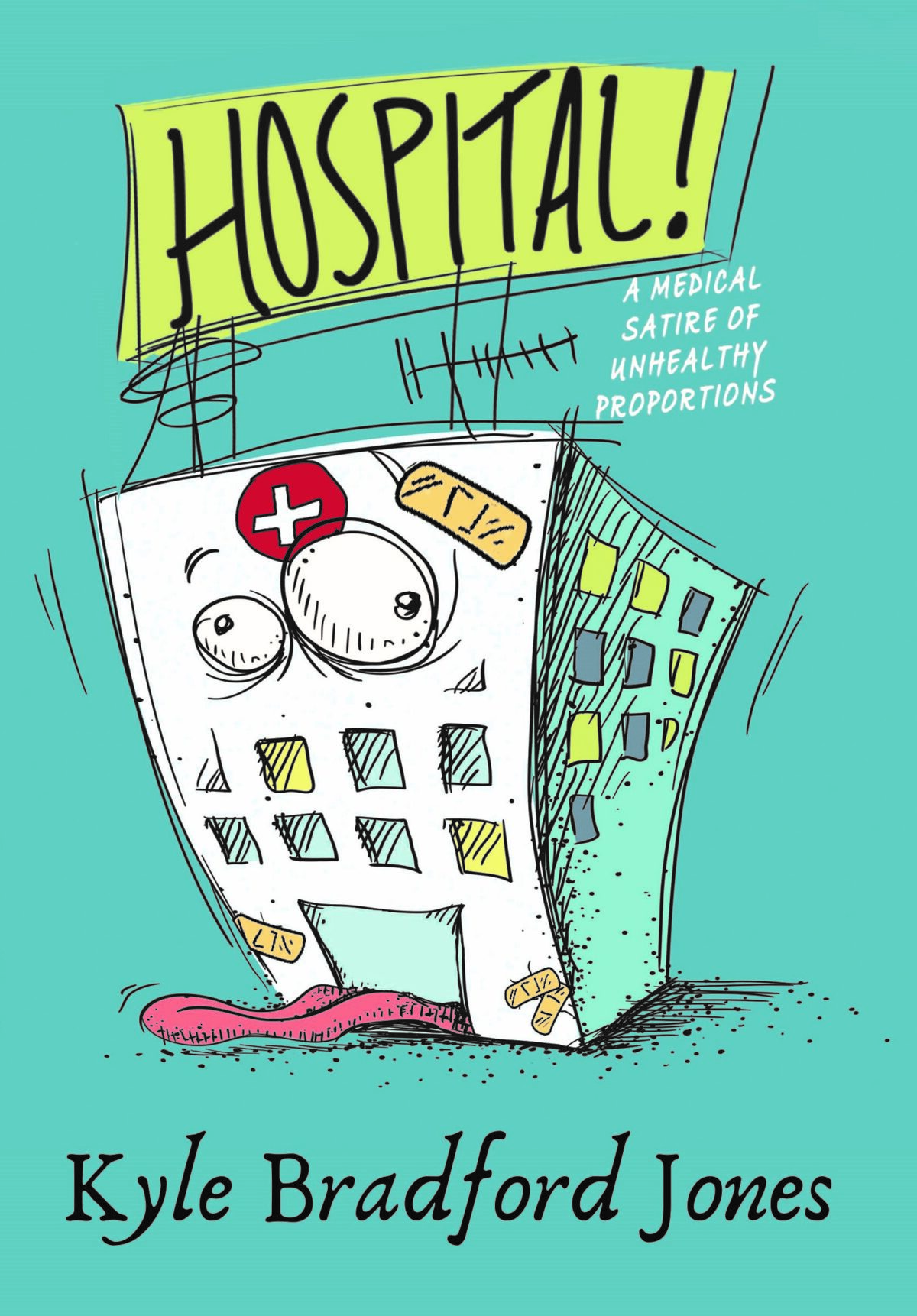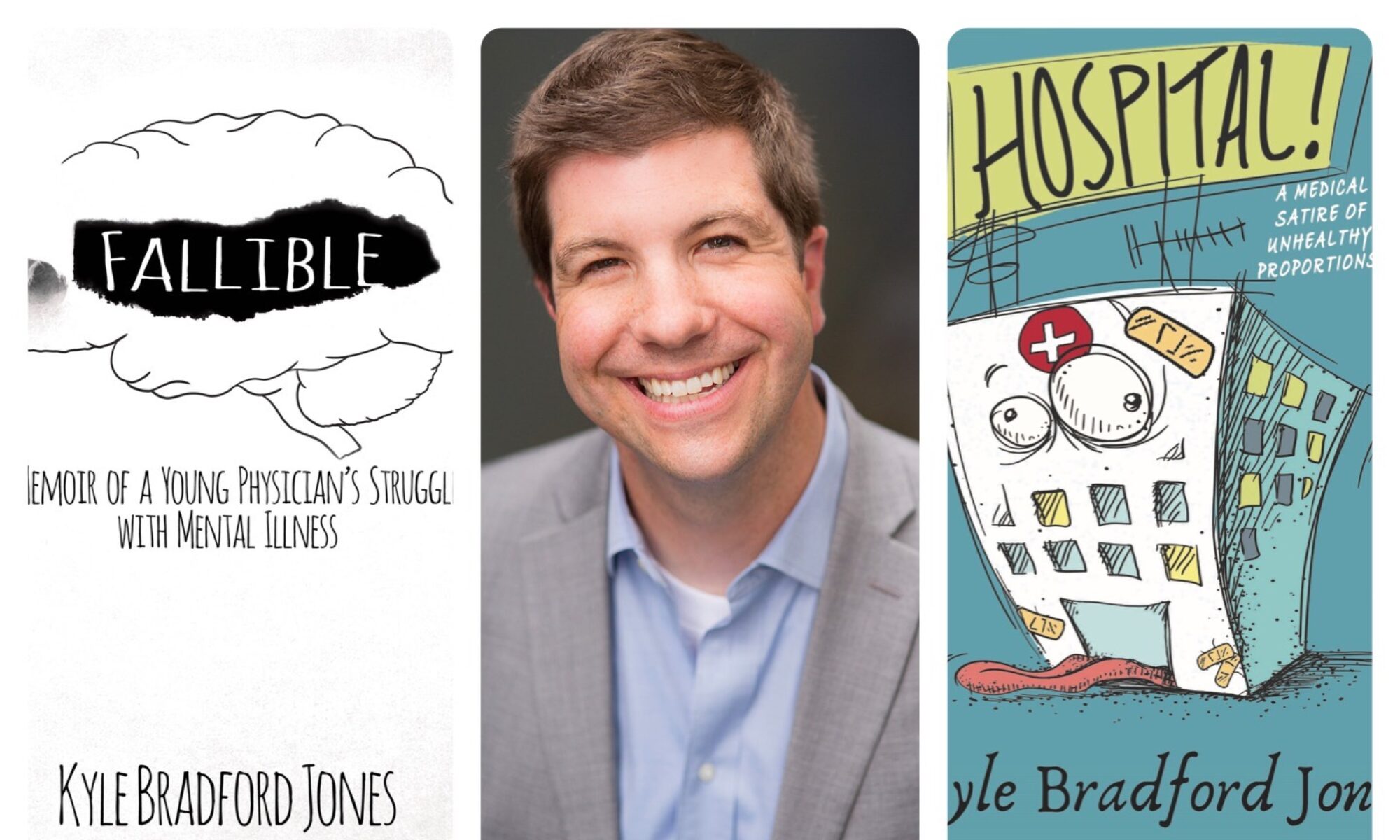Buy your copy of the full book here!

Chapter One: Dr. Camus is a Jerk
When Dr. Camus powered down the hallway of The Peloton Forward Crescendo Care Amicus Health Priority Catalyst Wellness Code Blue Memorial Hospital of Her Motherly Excellence (slogan: “We are a hospital”), the tail of his rumpled white doctor’s coat trailed behind him like the cape of an angry nineteenth-century magician. His short stature—no more than five-feet-five, though he claimed at least five-feet-nine—belied his scorn for humankind, instead of depicting a jolly elf-like demeanor typically expected of those without ample size. His entrance through the hospital lobby only worsened his mood, as the “fancy” player piano nearly constantly hit the wrong note, seeping further disorder and confusion into his perverse subconscious. Dr. Camus walked not only with a purpose, but with the explicit purpose of humiliating everyone possible in the wake of his ego; he intended to make everyone else pay for his own inadequacy and shortcomings (pun intended). Camus didn’t just want you to know how much he despised you. It had to be joined with the absolute certainty that he was better than you in every way, even though he was a man of few genuine talents. He had trolled people for so long about the Monkees being more talented than the Beatles that he now actually believed it, and thus repeated it to anyone who wasn’t listening. And, frankly, he also had a terrible haircut.
Dr. Camus didn’t have the typical baggage of an egomaniacal archetype. No one abused him as a child. He didn’t come from a broken home. No overcompensating to get his father’s approval. He wasn’t an alcoholic or drug addict. No broken marriages or other emotional traumas. He was simply a jerk. Nobody knew if he was always this way. I guess you’ll just have to wait for the prequel.
His face was half-scowl and half-grin, like the scabrous predator that he was. He embodied all that was negative of a supposedly once noble profession, the tradition of which he openly mocked in the way he treated his “calling”. He also refused to believe that he was ever actually called to such a vocation, a shocking disclosure to everyone in the old guard. No one even knew how he came to work at The Peloton Forward Care Crescendo Amicus Catalyst Health Priority Wellness Code Blue Memorial Hospital of Her Motherly Excellence; he simply kept showing up after his residency ended. It’s unlikely that anyone would purposely hire him.
Someone at the nurse’s station down the hall was smiling in anticipation of his arrival. She obviously didn’t know him.
“Hello Dr. Camus, my name’s Blanche. I’m caring for your patients in rooms 404 and 406.”
Blanche was short but big-boned, a squat ball of sweetness and deference. She was fresh out of nursing school, eager to make a good first impression on the notorious Dr. Camus on the first day of her first job. He abruptly halted his squatty gait, as though interrupted by the unexpected sight of a dinosaur.
“Blanche? Your name is Blanche? What kind of [BLEEP] idiot names their kid Blanche?” he said to the poor nurse, who was now shaking in fright. “It sounds like someone [BLEEP] on the floor with a magic [BLEEP] in their [BLEEP]. Or like someone vomited up their stomach. No, no wait, it sounds more like a truck having a baby, stuck on the side of the road, the back fender creaking and cracking until out bursts a [BLEEP]-sized [BLEEP]. BLANCHE! BLANCHE!”
He made a motion as though he were vomiting, his shoulders rolling forward and head jutting out like a chicken (because evidently that is what a truck giving birth would look like).
“My…my…mother was a…a…Golden Girls fan…”
She hoped an explanation would calm him down, but he didn’t even hear her. That was probably for the best.
The drab fluorescent lighting of the fourth floor of the mid-20th Century built hospital poisoned all reason and fed Camus’s emotions. His personality also did that, but the venomous environment combined with his innermost self to create a positive (negative?) reinforcement loop that made him more monster than man. Blanche had heard he was an angry git (though since she wasn’t British, she wasn’t exactly sure what that meant) so tried to prepare herself for something quite horrific. She was nevertheless mortified by his completely callous disregard of decorum.
“And another thing [BLEEP] Broad Shoulders—my name is pronounced Cam-US, not Cam-OO. It’s not French.”
“Why does everyone think it’s French?” he mumbled to himself.
Everyone else stared, anticipating a great show. One of the nursing aides used to make popcorn for everyone each morning while they watched an inevitable tirade against whoever raised Camus’s ire, but after he burned a bag and the entire floor reeked of scorched earth, he was forced to stop. Not for any patient-safety reason, mind you, but just because it made its way into the administration suite, and they simply would not tolerate such odors. Yet somehow more popcorn appeared instantly. I never quite understood why the staff wore 3D glasses, though.
The only staff afraid of Dr. Camus were the new ones, those who had yet to meet him but had heard stories. The rest found him wholly obnoxious and yet strangely interesting. A few nurses who had worked at the hospital for more than a couple of years actually did an impressive impression of the cantankerous doctor. (It wasn’t really that hard, just put together a bunch of BLEEPs in a row. Anyone can do it, really, though I would recommend the use of a censor.) They were still a bit uncomfortable when his indignation was aimed directly at them, but even then they found some perverse pleasure in the display.
The big problem (and also the biggest amusement) was that most of the time you had no idea what Camus was saying. His cursing curled the toes of the roughest sailor and stopped any soldiers in their tracks. His brand of swearing was to blend as many words together as possible, trying to achieve more emphasis out of the quantity of insults than the quality. This certainly seemed to mask the specific meaning of his diatribes, but still strongly emphasized his mindset. His goal was to be as scurrilous as possible to make others as uncomfortable and fearful as he was, though this wasn’t a conscious realization to him. Interestingly, he really only pushed the patronizing if someone spoke to him; he was too self-pitying to start the process on his own, and actually preferred avoiding people whenever possible.
“Are my [BLEEP] patients okay or did you screw them up too, like your [BLEEP BLEEP] parents did with your name?” He continued. “Though I’m sure they were lovely people,” he pinched out sarcastically.
“Um…well…they…uh…”
Blanche was already in the claw of terror and betrayal that everyone new to Dr. Camus entered. His dereliction of decency was deafening and defeated everyone in his path at first impression. (Sorry, alliteration with four words is a bit showy, but I couldn’t help myself. After all, I, your humble narrator, am British.) Blanche was also very confused as to why there was a man following Dr. Camus, who blew an air horn every time he cursed.
“Well, what a [BLEEP] coinquidink! My father was a [BLEEP] celibate monk, but that didn’t ruin my life! You know, you’re just like every other nurse, lab technician, respiratory therapist, medical assistant, administrator, admissions specialist, secretary, doctor, resident, student, parking attendant, janitor, IT guy, receptionist, advanced practice clinician—and did I say administrator?—peon, moron, doltish spawn, and [BLEEP] rat in this place; a complete [BLEEP BLEEP]!”
While it would appear that the Censor was working overtime today with Camus, he had a lot of practice and was quite good at anticipating Camus’s language. Since he astutely negotiated payment for every BLEEP he had to use, he actually took home more income than any of the physicians. The administration figured it was cheaper to employ this guy—with full benefits as well, mind you—than to risk offending patients and staff, and thus creating even more lawsuits than Camus already inspired as it was. It is even to discourage you, dear reader, from suing the publisher of this story for excessive swearing. So please cut us some slack here—the Censor is very expensive.
Blanche burst into tears from this slanderous rant and ran off. Nobody blamed her, but nobody stood up for her either. Everyone sulked away, disappointed that there weren’t more fireworks for the morning. Camus’s behavioral dehiscence had been present for years, a stark contrast with some of the other clinicians on staff who were actually quite polite. He took pride in driving away nearly a dozen nurses and other staff to find employment elsewhere, even though he failed to see how the constant influx of raw hirelings actually made his life worse. He simply had no insight into how his behavior affected him, only how it affected others.
“You’re doing quite well today, Censor,” Dr. Camus said as an aside to his professional shadow.
The Censor was probably the only person who Camus actually respected, so good was he at his job. Not liked, but respected. He was also one of the few people who saw right through Camus’s veneer to his black soul, finding nothing of substance remaining
from his charred humanity. The moral injury of entering medicine was too much for Dr. Camus’s sensitive psyche to handle, with everything he ever cared for crammed into the recesses of his subconscious. Hospital rumor was that he used to be a fairly likable fellow, but no one actually believed it. There is simply no appreciation of irony inside a hospital.
“Thanks. I’ve actually been considering shaking it up and using something other than ‘BLEEP’,” the Censor mused. “A different sounding horn, maybe? Or I could yell something like ‘YEET’. The teenagers would love that one.”
“Why mess with a [BLEEP] perfect system?” Camus retorted. He hated change. “It really is quite uncanny how you can predict my [BLEEP] cursing,” Camus added in a moment of rarely seen sincerity.
“No, I’d say it’s pretty canny. Quite canny, in fact,” responded the Censor.
The thing with Dr. Camus (among many other “things”) is that he wasn’t that great of a doctor. He assumed he was, but he treated his patients the same way he treated everyone else—like a dirty urinal. Camus paid little attention to them and interacted with them as little as possible. He frequently left nothing more than a proverbial (and sometimes literal, come to think of it) urinal cake in their room without speaking to them, aside from an occasional incendiary invective. His diagnostic and treatment thoughts arose from an unknown ether that often had no relation to the patient. This was the major difference between him and any sort of medical television trope; on TV, hospitals tolerated dirt bag physicians because of their incredible intelligence. This confused everyone all the more as to why the administration permitted Camus’s ongoing employment.
“This lady has pneumonoultramicroscopicsilicovolcanoniosis.”
She didn’t.
Camus yelled this to no one in particular but within earshot of everyone in the corridor, expecting someone to respond. He intended to confuse those not familiar with his favorite diagnosis, as the hospital was nowhere near a lung-damaging volcano. There is some question whether this is actually a diagnosis or simply a really long word to be used to impress people at cocktail parties. (I’ve certainly used it to some acclaim.)
“Start her on the usual treatment,” he shouted to no one and everyone at once.
No one knew if the joke was against the patient, the staff, or himself, but it appeared he was starting to believe in his diagnostic prowess.
“Dr. Camus, that’s the third case this week,” stated Nurse Man. Camus didn’t know any of the nurses’ names (other than Blanche), and so made up a nickname for each of them. “Are you sure that’s what’s going on? This lady came in with abdominal pain, not anything respiratory.”
Camus had somehow come across this “diagnosis” through a Wikipedia rabbit hole, and decided that more people would benefit from carrying that label. It was a process enviable to any millennial. No patient whom he had branded with this malady had similar symptoms to each other, but they tended to improve despite his efforts. He failed to grasp the biggest secret in medicine—99% of symptoms resolve without medical intervention. Granted, that one percent can be quite deadly (Dr. Camus only recently learned that being human has a 100% mortality rate), but thankfully, his patients were often more resilient than they should be. Perhaps out of necessity.
The staff adopted the notion that it was their job to protect the patients from him, which meant altering his orders or directly contradicting him to the patient’s face. They gave him incomplete information to guide his behavior, hoping to spare the patients the same condescension that he doled out to everyone else. It was easy because the other hospitalists developed order sets for the nurses to use for various ailments in such cases.
But I digress. Everyone fell silent after Nurse Man’s questioning, knowing the wrath immediately to follow from Camus. How dare someone question his authority and knowledge!? His expertise is second to none! (It’s not, and he knew it on some subconscious level, but would never admit it to anyone, including himself.) Some of those around attempted to leave the area, though not far enough that they couldn’t hear what he would say.
“Don’t you dare [BLEEP] my amazing [BLEEP] wonder of science, my [BLEEP BLEEP] incredible, phenomenal, and imperturbable way of [BLEEP] songlike [BLEEP] until the pillow rips! I’ve seen a million patients and I’ve rocked them all! It’s not my fault that there is an emetic of this stupid disease!”
“Don’t you mean ‘epidemic’?” the Censor quickly added.
Given his incorrect choice of words and astounding cursing pattern, no one knew what he was talking about, but the message was loud and clear. Except Nurse Man only smiled. He wasn’t showing any signs of fear. He saw right through Camus’s incompetence and toothless intimidation and met it with a sense of unflappability.
“You’re such a cliché, Dr. Camus,” said the nurse. He even pronounced the name Cam-MOO just to raise the doctor’s indignation even further.
“What did you say?”


